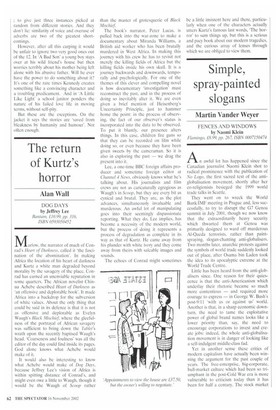The return of Kurtz's horror
Alan Wall
DOG DAYS by Jeffrey Lee Bantam, £10.99, pp. 316, ISBN 0593050452 Marlow, the narrator of much of Conrad's Heart of Darkness, called it the fascination of the abomination'. In making Africa the location of his heart of darkness and Kurtz a white man degraded beyond morality by the savagery of the place, Conrad has earned an unenviable reputation in some quarters. The African novelist Chinua Achebe described Heart of Darkness as an offensive and deplorable book'. It made Africa into a backdrop for the subversion of white values. About the only thing that could be said in its defence is that it is not as offensive and deplorable as Evelyn Waugh's Black Mischief, where the gleefulness of the portrayal of African savagery was sufficient to bring down the Tablet's wrath upon the recently baptised Waugh's head. 'Coarseness and foulness' was all the editor of the day could find inside its pages. God alone knows what Achebe would make of it.
It would also be interesting to know what Achebe would make of Dog Days, because Jeffrey Lee's vision of Africa is within spitting distance of Conrad's, and might even owe a little to Waugh, though it would be the Waugh of Scoop rather than the master of grotesquerie of Black Mischief.
The book's narrator, Peter Lucas, is pulled back into the war-zone to make a documentary about Miranda Williams, a British aid worker who has been brutally murdered in West Africa. In making this journey with his crew he has to revisit not merely the killing fields of Africa but the killing fields inside his own skull. It is a journey backwards and downwards, temporally and psychologically. For one of the themes of this clever and compelling novel is how documentary 'investigation' must reconstruct the past, and in the process of doing so inevitably alter it. We are even given a brief mention of Heisenberg's Uncertainty Principle, just to hammer home the point: in the process of observing, the fact of our observer's status is incorporated into the data to be observed. To put it bluntly, our presence alters things. In this case, children fire guns so that they can be recorded on film while doing so, or even because they have been given sweets by the cameraman. So it is also in exploring the past — we drag the present into it.
Lee, a one-time BBC foreign affairs producer and sometime foreign editor at Channel 4 News, obviously knows what he's talking about. His journalists and film crews are not as caricaturally egregious as Waugh's in Scoop, but they are every bit as cynical and brutal. They are, as the plot advances, simultaneously invaluable and murderous. An awful lot of manipulating goes into their seemingly dispassionate reporting. What they do, Lee implies, has become a necessity of the modern world, but the process of doing it represents a process of degradation as complete in its way as that of Kurtz. He came away from his plunder with white ivory and they come away from theirs with saleable images and sounds.
The echoes of Conrad might sometimes be a little insistent here and there, particularly when one of the characters actually utters Kurtz's famous last words, 'The horror' to sum things up, but this is a serious and pacy book about our modern tragedies, and the curious array of lenses through which we are obliged to view them.


























































































 Previous page
Previous page